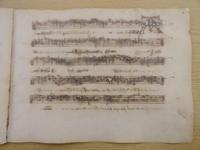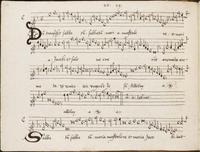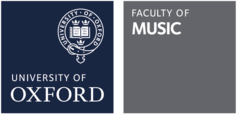Tudor Partbooks
The Manuscript Legacies of John Sadler, John Baldwin and their Antecedents
For full details visit our project website: www.tudorpartbooks.ac.uk
The Tudor Partbooks project aims to:
- make Tudor polyphonic music manuscripts publically available through the digitization of the key partbook sets and their concordances
- undertake and publish holistic studies of these manuscripts
- improve our understanding of the practices of Tudor music scribes
- return the Sadler partbooks to full readability via digital restoration
- restore the Baldwin partbooks through the provision of a new tenor partbook
- explore, through practice-led research, the most effective methods for reconstructing missing voice-parts
This three-year project – a collaboration between the Universities of Oxford and Newcastle funded by the Arts and Humanities Research Council – will digitize all the extant manuscripts of Tudor polyphonic music from c.1510-1580 preserved in partbook format (where each vocal part is written in a separate book). These will be made publicly available via the DIAMM website.
Two key exemplars of this repertory – the Sadler and Baldwin partbooks – will also be restored and reconstructed. The Sadler partbooks are badly corroded by the acidic ink used in their copying, leaving them extremely fragile and partially illegible. A process of digital reconstruction will restore these manuscripts to a readable state, allowing their music to be accessed and performed again.

One of the Sadler Partbooks (Bodleian Library, Mus. e.2, f.16r) showing the corrosive (but digitally reversible) effects of the acidic ink
The Baldwin partbooks require a different process of restoration. This is a set with one book missing (the tenor), rendering all their music incomplete. While some of the music can be found in other sources, about sixty pieces are found nowhere else. A process of collaborative reconstruction drawing on the expertise of both scholars and performers will create a plausible version of the missing parts, allowing these works to be performed and developing a greater stylistic understanding of the repertory in the process.

One of the Baldwin part books (Christ Church Library, MUS 979, p.34)
The research team will also be undertaking a detailed scholarly investigation of these sources, looking for connections in how they were copied, their notational styles and practices, their format, their contents, and the contexts in which they were written and used. In particular, although these partbooks postdate the Reformation, they are the dominant sources for much English church music from earlier in the century. We’ll be looking at the extent to which these sources preserve pre-Reformation practices, or make adaptations to suit later (and non-liturgical) use.
We’ll be making the results of this project available via the DIAMM website, through publishing restored facsimile editions of the Sadler and Baldwin partbooks, and through academic articles and publications. There will also be a series of reconstruction workshops, study days, public events (including concerts and exhibitions), and podcasts throughout the project.
You can follow our progress and get further information about our events at:
www.tudorpartbooks.ac.uk, www.facebook.com/tudorpartbooks or by following @TudorPartbooks on Twitter.
20/27/29 April Workshop: Digital Restoration of Manuscripts: an Introduction to Techniques (IT Services, Banbury Road, Oxford), led by Julia Craig-McFeely. During this workshop you’ll be shown the basic techniques for digitally restoring manuscripts and get the chance to have a go for yourself. Because of popular demand, the workshop is available on three dates: 20 April (10:00-13:00); or 27 April (10:00-13:00); or 29 April (13:00-16:00)
12 May Study Day: Henrician Music in the British Library (British Library, London, 10:30-17:00). An informal investigation of the key musical sources from the 1520s and 1530s (Harley 1709, Add. 34191; Roy. App. 45-48; Twenty Songes), with particular emphases on the wider chronology, relationships between sources, contexts, Thomas Tallis, and Nicholas Ludford.
16 July Public Lecture: Making Music in Elizabethan Northamptonshire – Magnus Williamson with Stile Antico (St Peter’s Church, Oundle, 13:00-14:00), in partnership with the Oundle International Festival;
Concert: Music from the Sadler Partbooks – Stile Antico, with Magnus Williamson (St Mary & All Saints, Fotheringhay, 19:30-21:30), as part of the Oundle International Festival.
13-15 November
Workshop: RECON 2: the second residential workshop dedicated to polyphonic reconstruction is provisionally planned to take place at Sidney Sussex College, Cambridge.
19 November Study Day: Print and Manuscript (Christ Church, Oxford); part of a series of study days on early printed music, this event takes as its starting point the inclusion of copies of the 1575 Tallis/Byrd Cantiones in the Baldwin Partbooks (GB-Och Mus. 979-983).
For all these events, further details can be found at : http://www.tudorpartbooks.ac.uk/newsevents/
Sessions on editing Tudor polyphony and completing missing parts will be led by Magnus Williamson, Owen Rees, Andrew Johnstone and John Milsom.
Register by 31st March via: http://www.oxforduniversitystores.co.uk/browse/extra_info.asp?compid=1&modid=5&deptid=120&catid=190&prodid=969&coursedate=2059
Registration is £5 (free to students).
More details at: https://www.facebook.com/events/155549038802875
Owen Rees (chair)
Nicolas Bell
Sally Dunkley
John Harper
Martin Holmes
Andrew Johnstone
David Mateer
Kerry McCarthy
John Milsom
Nick Sandon
David Skinner
Philip Weller
Richard Wistreich
Project Partners:
DIAMM (Digital Image Archive of Medieval Music)
Bodleian Library
British Library
British Academy
Oundle International Festival
Project Collaborators:
Contrapunctus
Stile Antico
Page last edited - 14 Dec 2021



